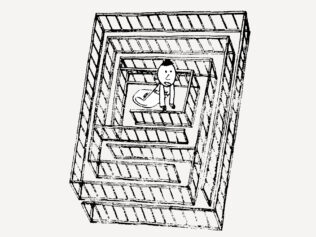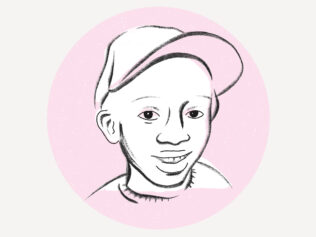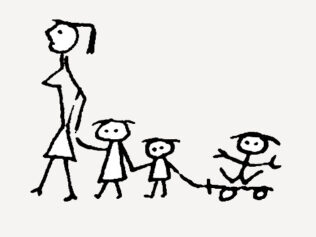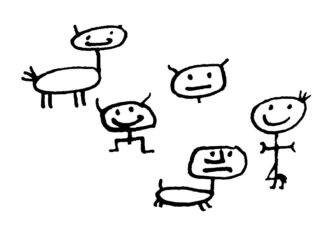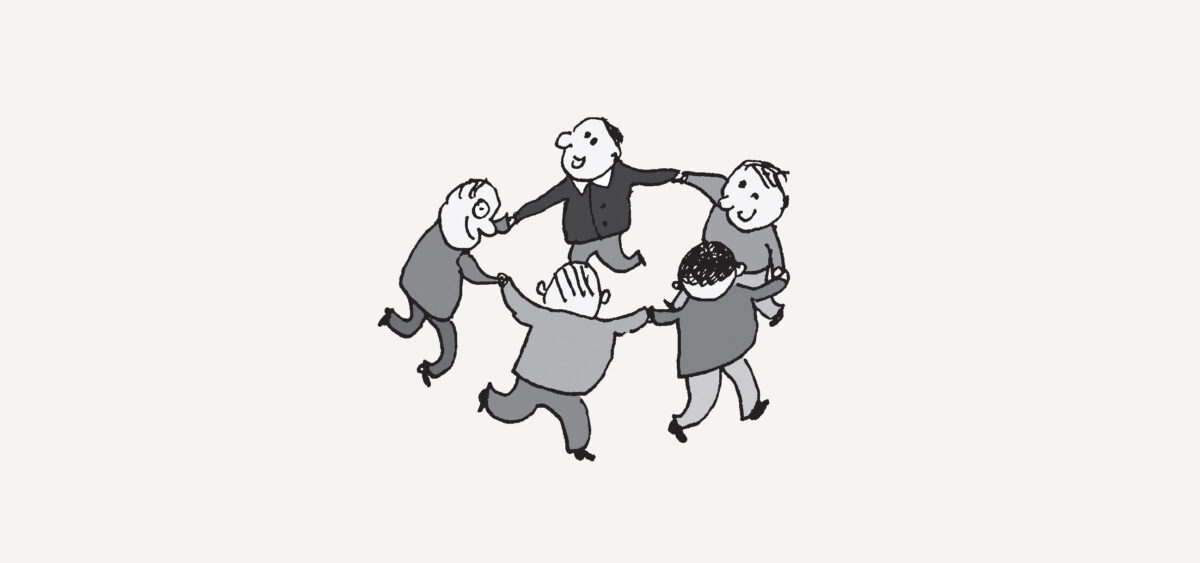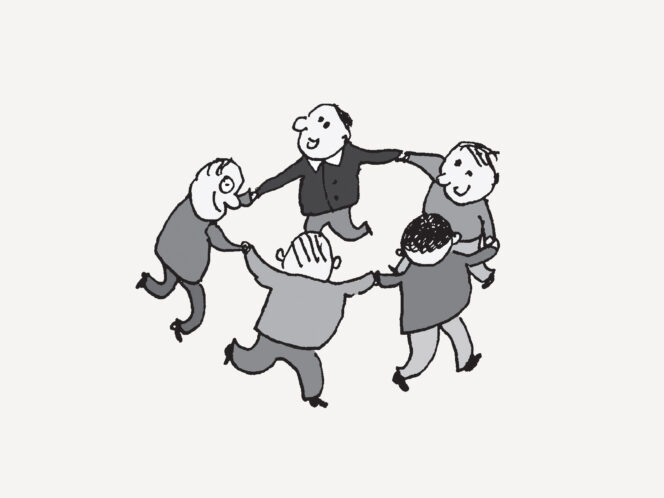
Berenika Steinberg interviews 9-year-old Marianna about the coronavirus and quarantine.
Berenika Steinberg: You had to do a two-week quarantine, because the pandemic caught up to you when you were on a trip to Edinburgh with your mum, aunt and older brother. How did you feel when you found this out?
Marianna: At first I had this unpleasant feeling that I’d have to spend so much time with my brother in Aunt Hania’s little flat. But then I was happy that we would all be together. And once we were in quarantine, the worst feeling was when my dad would bring us sweets, and he always bought the stuff we don’t like. Like chocolate with a funny aftertaste, with a liquor filling. I wanted ice cream, but I know he couldn’t bring it, because he did the shopping by our house in Sulejówek and by the time he’d be able to get it to my aunt’s place in Warsaw, it would have melted.
Then you went home, to Sulejówek.
Yes, now we’re all together: my grandma, great-grandma, our pets, my brother Stasiek, my dad, Aunt Hania, my mum and me. So I’m not bored, because there’s plenty that can happen. Like Stasiek does something silly and then Aunt Hania starts to talk and talk to him, and then my mum joins in, then my grandma says something, so she’ll be the center of attention. And at the end when everybody calms down and somebody wants to go to the toilet, it turns out that right at that most important moment my great-grandma’s in there. So in general there’s a lot going on, it’s fun.
What silly things does Stasiek d o that make your aunt so angry?
For example, he wants to send in his homework at the last minute. My aunt says he should do it right away, so that his teacher will have more time to check it. Then my brother says “Noooooooo, I’ll send it on Monday, I want to do my PE now!”
PE?
His teacher sends him PE homework, like he has to do 100 sit-ups in four sets. So Stasiek does one sit-up, Aunt Hania takes a picture and sends it to the teacher, and then he does the rest. I think lots of people just take the picture and that’s it for PE.
What does your PE look like?
My teacher made us dribble a ball. That was still during quarantine in Warsaw. And Aunt Hania would get irritated, she even got angry at my teacher. “Whaaaaat?” she’d say. “How can you dribble a ball in a small flat in a tower block?” The ball flies around and bounces off everything. And also the neighbors downstairs hear this boom , boom , boom , like if somebody was jumping.
Did you also have to send your teacher pictures?
Yes – how I dribbled, and jumped safely over obstacles. So I jumped over egg cartons, and my aunt took pictures. It was funny when Stasiek had PE and was doing his sit-ups. First, Aunt Hania joined in, then Mum, and then finally me. And then there was no room for him to finish his exercises.
Do you miss your classmates?
Yeah. I only have one who’s friendly. The others talk about you, do things that aren’t nice. They’ve been like that since kindergarten, so I’m used to it.
Do you see your class on the computer screen during lessons?
No, our teacher doesn’t want to do any special meetings. She just sends us homework on Librus, we check there, do it and send it to her. Dad’s at work, Mum’s sewing, so most often I do it with Aunt Hania.
And how’s it going?
It’s pretty good, I think. Because she gives us more to do, but at home you usually do it faster than at school. Our teacher can’t explain things like my aunt can.
Do you remember the moment you first heard about the coronavirus?
At first I was kind of… disgusted. I didn’t really feel it. Maybe I was a little scared, but the coronavirus was still just in China, so I Googled “How far away is China from Poland?” I decided that if it’s so far, maybe it won’t get to us. At that time, we were still going to school, so we were all joking about it. Because we have this guy Stefan, whose surname is Korona, and Michał kept saying that if we touch Stefan Korona, we’ll get infected. Then the teacher got mad and said if we touch China on the globe we’ll get infected. We were all joking, and she wanted to joke, too.
But did Stefan Korona laugh at Michał’s jokes?
Yeah. In general, Stefan Korona likes to tease other people, but when it comes to him being teased then he’s not happy.
Did your teacher make you wash your hands?
Yes. One girl, Ania, brought a big bottle of alcohol disinfectant and the teacher always took it from her, like she wanted to check something, and she poured out half the container – on her hands, on her desk. every day. So the whole class stank of alcohol.
In Sulejówek do you wear masks?
Yes, just not in the forest, because there’s no people there.
Do you go to the shops sometimes?
The ladies go shopping by themselves. But today I had to go to the dentist in Warsaw, and then we went to Sadyba Best Mall!
How was it?
We went in – masks, sweaty noses. It was like a waterfall of sweat coming off me! I tried not to touch anything. I held the bag, so I wouldn’t even be tempted. I only touched one thing, in Smyk, to find what I’ve been dreaming of – an Enchantimal. It’s kind of a doll with a pet; I have three.
Did you find it?
Yes, and Aunt Hania bought it for me!
Did your parents make you afraid of the coronavirus?
No, our teacher did; my parents didn’t have it.
What did she say?
If you don’t wash your hands, you’ll get infected and you’ll infect the whole school. Or she threatened one of our classmates, Mikołaj. Because he had allergies. He lives in the forest, and everybody knows lots of things grow there that you can get allergic to. So he was sneezing all the time. And she told him: “Santa Claus! If you don’t stop sneezing, I’ll tell your parents to do something with you, because you could be infected! Every time you sneeze, you have to wash your hands for thirty seconds!” And he would always go to the sink and wash his hands, so in two days we ran out of soap. She told him if he came to school the next day, she’d call his parents.
And what happened?
His parents got angry, and Mikołaj came to school. When the teacher saw him, she started to shout: “You weren’t supposed to come, because you’re infected with the coronavirus!” And she wanted to write in his record that he doesn’t listen to the teacher. Then he started crying, because he had already explained to her that he just had allergies. She let him into class, but she moved us around so the first row in front of her was empty. And she put Santa maybe not in the last row, because he was too short, but about three meters from her.
Were you guys afraid you could catch it from him?
Yeah. In general, our class isn’t so silly that we’d think Santa was infected. I mean, we all know where he lives.
Have you been afraid of the coronavirus at all?
There are times. Whenever I hear on the evening news how many people are infected and how many died, I try to close my ears, and not watch. Because then I start to feel sorry that so many families lost members because of it. That’s why I try not to think about how many people have died, but how many have recovered.
Are you afraid that somebody you love could die?
Yes. When they’re saying on TV all the time that now it’s calming down, but after a while there’s going to be a boom. Then I start to think that yes, somebody from my family could die.
How do you feel then?
Like something’s jabbing me in the heart, I think about it and I want to cry.
Do you talk about it with your aunt or your parents?
I think I told them once. But later I stopped. Once is enough, I’m not going to remind them of it. When I’m afraid, I go play with my Enchantimals. And then I forget about it.
What do you think – when will all this end?
Not before the end of the year. Maybe it will calm down for a bit, but I’m definitely not going back to school before summer vacation. Because, you know, my teacher will be afraid, so I’m sure she’ll tell the headteacher not to open the school. So I’m happy.
Do you have any general reflections about the epidemic? Whose fault might it be?
People in general. I think this coronavirus happened because people don’t sort their rubbish and Mother Nature held up her hand and said: “This is how it’s going to be now. And if you clean up and start to care for Planet Earth, then maybe I’ll put my hand down.”

Translated from the Polish by Nathaniel Espino







